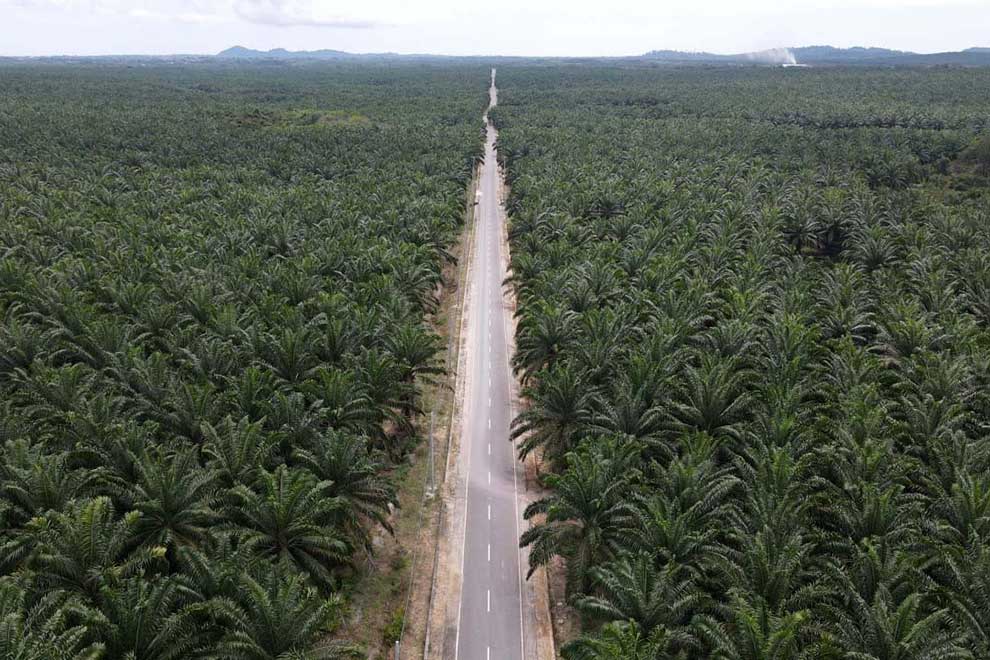
An oil palm field in Bulutumbang, Belitung, Indonesia. Maintaining environmental sustainability and community well-being is vital to sustain palm oil industrial operations. THE JAKARTA POST
Indonesia's elevation of biodiesel as a renewable energy source might, in turn, jeopardise its climate policy as the country’s prevailing policy regarding the fuel increases the risk of deforestation, a recent report has revealed.
The government is pushing for mandatory use of diesel fuel blended with 30 per cent palm-based biofuel, known as the B30 biodiesel fuel. For the next step, authorities are expecting to roll out B40 biodiesel with 40 per cent biofuel blend by 2022.
The B30 policy plays an important role in the government’s efforts to slash oil imports and to open new markets for its palm oil exports. It is also expected to support the country in its goal to transition away from fossil fuel-based energy sources.
But a report recently published by international non-profit organisation the CDP suggests that the country’s biofuel policies are not in alignment with environmental-protection policies.
The group’s senior global policy manager for forests Helen Finlay acknowledged the biofuels’ role in Indonesia’s energy transition from fossil fuels.
“However, it is important that they are developed in a way that does not undermine climate and development goals,” Finlay told The Jakarta Post in a recent interview.
In 2018, the government put a moratorium on new permits for oil palm plantations amid concerns about deforestation and tenurial conflict related to plantations owned by smallholders and corporations inside natural forests.
However, the CDP has called the moratorium’s effectiveness in preventing deforestation into question. It cites data from the Ministry of Agriculture showing that the area of plantations increased from 14 million hectares in 2018 to more than 16 million in January last year.
Despite the moratorium, the group also warned that demand for palm oil as a raw material in biofuel development would still increase, while current plantation yields would be insufficient to fulfil such needs.
The ministry estimated in 2017 that the country produced an annual average of six-to-seven tonnes of palm oil per hectare from smallholders and private companies’ plantations. Without significant productivity improvements, the CDP estimates that the current biofuel policy will see an additional 4.5 million hectares of forest lost to plantation expansion.
“Failure to optimise the yield productivity of existing plantations presents a missed opportunity for achieving the goal of preserving forests,” said Finlay.
Further expansion of oil palm plantations will increase greenhouse gas emissions produced from the forestry sector. Emissions from plantations already contribute more than 80 per cent of the emissions produced in the biodiesel supply chain.
The CDP argues this will set back progress made by Indonesia in fulfilling its greenhouse gas emissions-reduction target. As of March, the Ministry of Environment and Forestry claimed to be verifying around 297 million tonnes of carbon dioxide equivalent (CO2e) from the forest and land use sector.
The country relies heavily on the forestry sector in its emissions reduction goal, which is expected to contribute around 17.2 per cent of the 2030 emissions-reduction target in the nationally determined contribution (NDC). Indonesia has pledged to reduce its greenhouse gas emissions by 29 per cent or around 826 million tonnes of carbon dioxide – or 41 per cent (1.02 billion tonnes of carbon dioxide) with international assistance – by 2030.
The CDP recommends the government better align its biofuel and forest-protection policy to prevent the industry from harming Indonesian forests, as well as to improve environmental safeguards for palm oil production.
The group also suggests that the government should support smallholders in increasing their yields. The government should also include them in the biodiesel supply chain to fulfil increasing demand for raw materials and, eventually, prevent plantation expansion.
“The government should also encourage corporate disclosure across the biofuel supply chain to ensure greater transparency on the environmental impact of their activities,” Finlay said.
Edwin Mahatir, the head of the palm oil cooperation policy subdepartment in the Office of the Coordinating Economic Minister, said the government required plantations to adhere to emissions-reduction measures in the Indonesian Sustainable Palm Oil (ISPO) certification.
“When plantations are certified with the ISPO, they will also implement good agricultural practices,” Edwin said during an online discussion on June 17.
While the government requires all plantations to be ISPO-certified, only about one-third of 16.38 million hectares of oil palm plantations are currently certified. Most plantations owned by private companies and state-owned firms have been certified. But fewer than one per cent of smallholder plantations have been legally authorised despite accounting for around 41 per cent of total oil palm plantations in the country.
The government also made ISPO certification a requirement for plantations supplying biofuel producers in 2020.
Palm Oil Farmers Union (SPKS) secretary-general Mansuetus Darto said making sure smallholders increased their yield might be tricky as most of them had yet to be certified, meaning their harvests could not be immediately absorbed by domestic and international markets.
A recent referendum in Switzerland on a free trade agreement with Indonesia might also pile on the agony. While the European country agreed to reduce duties on Indonesian palm oil by between 20 and 40 per cent, importers must prove that the product meets certain environmental and social standards.
The challenge of sustainability certification might result in most palm oil produced by smallholders going to waste, especially after they increase their plantations’ productivity without guidance on better environmental standards, Mansuetus said.
He added that smallholders had not been included in the biodiesel programme as fuel producers tended to disregard smallholders.
THE JAKARTA POST/ASIA NEWS NETWORK











